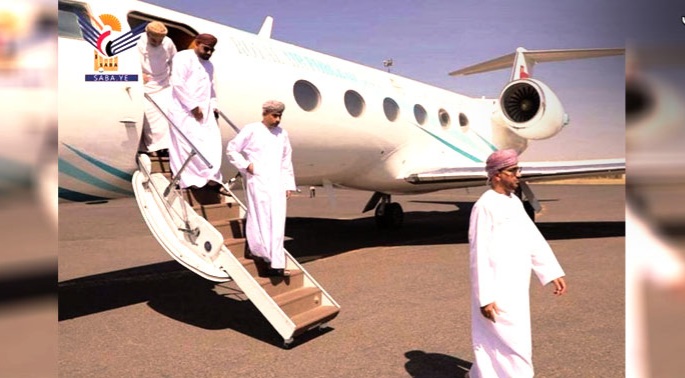Meanwhile, amid Ansarullah’s warning that no-peace-no-war situation will not last long and Sana’a is losing its patience, the hellish days of pre-ceasefire are returning to the Saudis.
Ansarullah, in order to show its threats are serious, has embarked on a new stage of deterrent actions. Ansarullah, firstly, stopped the flow of Yemeni oil looted by Saudi tankers by several drone attacks on Al-Dhabh oil port where Yemeni oil is shipped abroad by the aggression forces in Hadramaut province and Al Qana port in Shabwah province, overlooking the Gulf of Aden and the Arabian Sea. Secondly, it launched sea patrols, directing the threats to the Saudi oil transfer fleet.
This new deterrence model very soon yielded its results, to an extent that in recent days the Americans and Saudis through UN mediator and also Oman have taken steps to de-escalate tensions and persuade Ansarullah to extend the ceasefire deal.
As part of these efforts, an Omani delegation arrived in Sana’a on December 21, just two days after the beginning of the new round of threats by Ansarullah authorities. Ansarullah’s chief negotiator Mohammad Abdul Salam said after the negotiations with the Omani delegation that the Omanis put forward ideas from the Saudi side and other international parties. Before that, the US Department of State had announced in a statement on November 28 that Hans Grundberg, the UN special envoy to Yemen, had visited the region to advance negotiations and held talks with the Saudi, Omani, and Yemeni sides.
Though details of the Saudi conditions have not yet been leaked to media, Sana’a officials have already insisted on paying the salaries of the state employees across Yemen, lifting the ban on the airports especially that of Sana’a, and also reopening the ports can shape the ground for advances in humanitarian case as a prelude for other settlement of cases.
These conditions mean that Ansarullah is ready to fulfill the other party’s demands only to the extent they fulfill Ansarullah's demands. Ansarullah officials had said the reason for not renewing the two-month ceasefires for the third time was the lack of balance between the achievements of Sana’a and the Saudi side. In early October, the UN envoy made a proposal to extend the ceasefire agreement for 6 months, but was turned down by Sana’a which complained about Saudi treachery during the earlier ceasefire rounds.
Saudis reluctantly resort to Oman
The Saudi heading to Oman for possible progress in the truce negotiations with Ansarullah highlights Riyadh’s weak position in the face of new wave of Sana’a threats.
In general, Saudis are not happy with Oman’s approach to Yemen war. Just a week after the start of the Saudi-led coalition’s invasion of Yemen, and while the Saudis were desperately seeking to show the (Persian) Gulf Cooperation Council united against Ansarullah, Saudi Arabia’s King Salman bin Abdulaziz received a special message from Qaboos bin Said, the late Sultan of Oman, and was told that Muscat would not take part in the Riyadh-led Arab coalition and recommended stop of the military campaign.
Although the Omanis have mediated in the negotiations during the 8 years of war, the Saudi coalition has always accused Muscat of supporting Ansarullah and used the word “coordinator” for the Omanis instead of a mediator. Now, after being disappointed with a success of the UN representative, resorting to the Sultanate of Oman, which is highly respected by Ansarullah and its regional supporter Iran, means that Riyadh is very scared and anxious about Ansarallah’s threats to start a war.
In the latest round of threats, President of Yemen’s Supreme Revolutionary Council Mohammad Ali al-Houthi hinted at resumption of strikes on Saudi oil facilities, to zero its exports.
“Saudi Arabia constantly announces surplus in the budget. I advise it to reduce taxes in order to leave an opportunity for rest for citizens. In the event of renewed confrontations, the budget may return to what it was in 2018/2019,” his Twitter post read.
Record of Oman’s mediation in Yemen war
As mentioned above, Oman, which shares ground borders with Yemen, mediated several times to facilitate the negotiations and defuse the clashes. In February 2018, Sultan Qaboos called for the international community’s “coordinated efforts” to find a political solution to the conflict.
Also, according to UAE’s English-language newspaper The National, in March 2018, Sultan Qaboos expressed to the time’s US Secretary of Defense James Mattis about a mediatory role to settle Yemen case peacefully.
In that month, Muscat hosted a meeting of Ansarullah and American representatives, their second meeting since May 2015.
Also, in mid-October 2020, Muscat mediated the agreement on the release of two American citizens imprisoned in Yemen and the return of the body of an American citizen named Bilal Fateen.
Due to its proximity to Yemen, neutrality in war, and
humanitarian aids delivery to Yemen in the tough times of war and
all-out embargo, Oman has high respect in the eyes of Yemen’s National
Salvation Government and this grants it a major role to play in the
negotiations and end of the eight-year war.
/129

